
Ecuador, officially the Republic of Ecuador, is a country in northwestern South America, bordered by Colombia on the north, Peru on the east and south, and the Pacific Ocean on the west. Ecuador also includes the Galápagos Islands in the Pacific, about 1,000 kilometers (621 mi) west of the mainland. The country's capital is Quito and its largest city is Guayaquil.
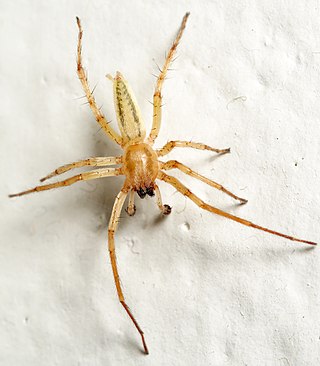
Anyphaenidae is a family of araneomorph spiders, sometimes called anyphaenid sac spiders. They are distinguished from the sac spiders of the family Clubionidae and other spiders by having the abdominal spiracle placed one third to one half of the way anterior to the spinnerets toward the epigastric furrow on the underside of the abdomen. In most spiders the spiracle is just anterior to the spinnerets.

The national flag of Ecuador, which consists of horizontal bands of yellow, blue and red, was first adopted by law in 1835 and later on 26 September 1860. The design of the current flag was finalized in 1900 with the addition of the coat of arms in the center of the flag. Before using the yellow, blue and red tricolor, Ecuador's former flag had three light blue stripes and two white stripes with three white stars for each province of the country. The design of the flag is very similar to those of Colombia and Venezuela, which are also former constituent territories of Gran Colombia. All three are based on a proposal by Venezuelan General Francisco de Miranda, which was adopted by Venezuela in 1811 and later Gran Colombia with some modifications. There is a variant of the flag that does not contain the coat of arms that is used by the merchant marine. This flag matches Colombia's in every aspect, but Colombia uses a different design when her merchant marine ships are at sail.

The Adige is the second-longest river in Italy, after the Po. It rises near the Reschen Pass in the Vinschgau in the province of South Tyrol, near the Italian border with Austria and Switzerland, and flows 410 kilometres (250 mi) through most of northeastern Italy to the Adriatic Sea.

Carchi is a province in Ecuador. The capital is Tulcán. The Carchi River rises on the slopes of Chiles volcano and forms the boundary between Colombia and Ecuador near Tulcan. Rumichaca Bridge is the most important land route between Colombia and Ecuador.

Sucumbíos is a province in northeast Ecuador. The capital and largest city is Nueva Loja. It is the fifth largest province in the country, with an area of 18,084 km2. In 2010, it had a population of 176,472 inhabitants.
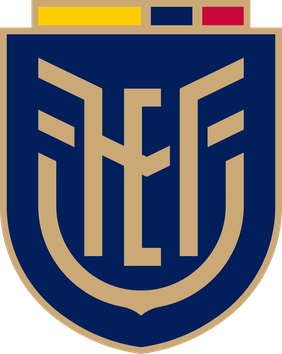
The Ecuador national football team, nicknamed La Tricolor, represents Ecuador in men's international football and is controlled by the Ecuadorian Football Federation (FEF). They joined FIFA in 1926 and CONMEBOL a year later.

Barbacoan is a language family spoken in Colombia and Ecuador.

The Ecuadorian–Peruvian territorial dispute was a territorial dispute between Ecuador and Peru, which, until 1928, also included Colombia. The dispute had its origins on each country's interpretation of what Real Cedulas Spain used to precisely define its colonial territories in the Americas. After independence, all of Spain's colonial territories signed and agreed to proclaim their limits in the basis of the principle of uti possidetis juris, which regarded the Spanish borders of 1810 as the borders of the new republics. However, conflicting claims and disagreements between the newly formed countries eventually escalated to the point of armed conflicts on several occasions.

Chiles is a volcano on the border of Colombia and Ecuador. It lies 3 kilometres (2 mi) south-east of the volcano Cerro Negro de Mayasquer, and the two peaks are considered part of the same Chiles-Cerro Negro volcanic complex. The volcanoes, together with the Cumbal are andesitic in rock type. A 1936 eruption reported by the Colombian government agency Ingeominas may have been from the Ecuadorean volcano Reventador, otherwise the volcano has not erupted for around 160,000 years.
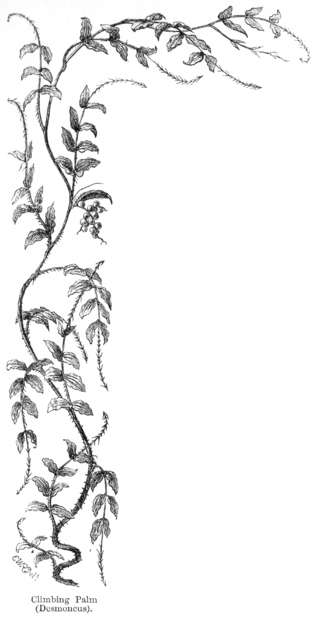
Desmoncus is a genus of mostly climbing, spiny palms native to the Neotropics. The genus extends from Mexico in the north to Brazil and Bolivia in the south, with two species present in the southeastern Caribbean.
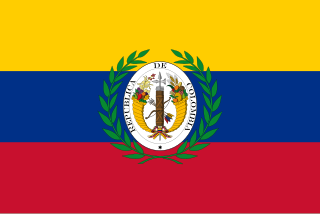
Gran Colombia, or Greater Colombia, officially the Republic of Colombia, was a state that encompassed much of northern South America and part of southern Central America from 1819 to 1831. It included present-day Colombia, mainland Ecuador, Panama, and Venezuela, along with parts of northern Peru, northwestern Brazil, and claimed the Essequibo region. The terms Gran Colombia and Greater Colombia are used historiographically to distinguish it from the current Republic of Colombia, which is also the official name of the former state.
Microryzomys altissimus, also known as the Páramo colilargo or highland small rice rat, is a species of rodent in the genus Microryzomys of family Cricetidae. It is found in Colombia, Ecuador, and Peru, but the Colombian segment may be a separate species.

Brunellia is a genus of trees. They are distributed in the mountainous regions of southern Mexico, Central America, West Indies, and South America. Brunellia is the only genus in the family Brunelliaceae. As of 2001 there were about 54 species.

Pholidostachys is a genus of palms found in Central America and northwestern South America.

The following outline is provided as an overview of and topical guide to South America.
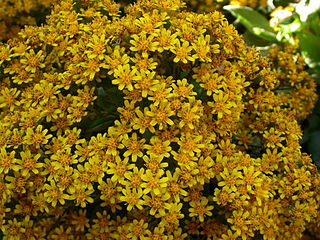
Acrisione is a genus of the tribe Senecioneae of the family Asteraceae, native to Chile and southern Argentina. It was first described as a genus in 1985.

Thessia is a genus in the family Hesperiidae (Eudaminae).

Athesis is a Neotropical genus of clearwing (ithomiine) butterflies, named by Edward Doubleday in 1847. They are in the brush-footed butterfly family, Nymphalidae.

Athesis clearista is a species of butterfly of the family Nymphalidae. It is found in Venezuela and Colombia.



















